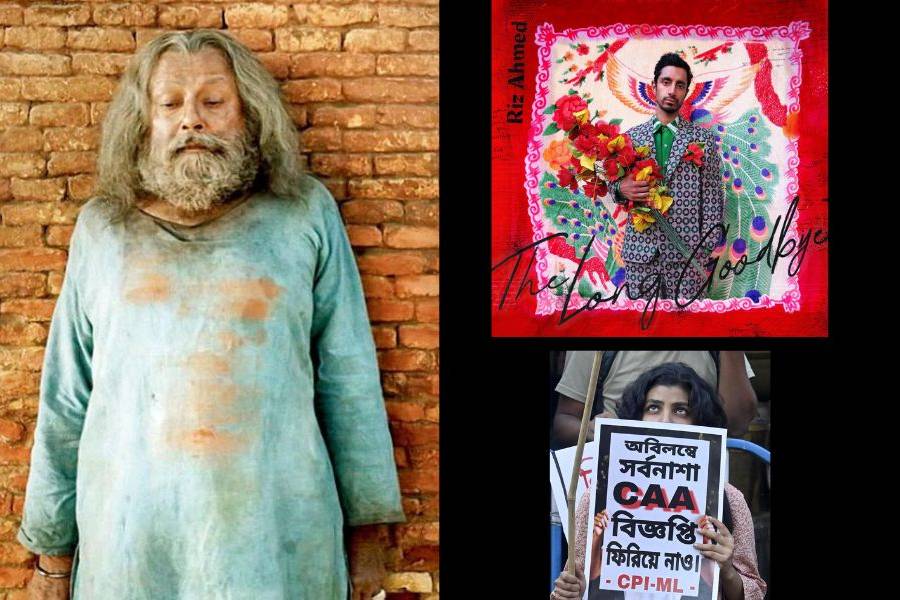Two threads. Thread No. 1. A 30-something man was found hanging from the ceiling of his home in Calcutta sometime in March. The hurly-burly of the elections had barely begun and the BJP had once more raised the bogey of the Citizenship Amendment Act or CAA. On March 11, it notified the rules for the implementation of the CAA, which attempts to fast-track Indian citizenship for all refugees and asylum seekers from Pakistan, Afghanistan and Bangladesh, except Muslims. The man, Debasish Sengupta, had reportedly taken the extreme measure because he was unable to handle his anxieties related to the CAA. His family has roots in present- day Bangladesh.
Thread No. 2. Sometime late February, a post surfaced on social media, it was the announcement of a talk at a university in Montreal, Canada, titled “What’s My
F@cking Name? Partition, Diaspora, and Translation in Rap versions of Toba Tek Singh”. Yes, two apparently disparate threads.
The Toba Tek Singh of the talk title is a short story by Sadat Hasan Manto. It is also the name of a place that is now in Pakistan.
Manto’s story probes the question — what did Partition mean for the last man
in the subcontinent? Implicit in the setting of his story is the long march of madness that followed.
The period is 1949-50. The setting is a lunatic asylum in Lahore. An exchange is happening so the newly-carved nations have neat edges, clean divisions — Muslim inmates are to be brought back to Pakistan, and Hindu and Sikh inmates are to be sent away to Hindustan. The story takes its name from one such inmate — Bishan Singh — a Hindu Sikh from Toba Tek Singh, who is also referred to by other inmates as Toba Tek Singh. The man has a set mad banter the basic template of which is this: “Upar di gur gur di annex di be dhyana di mung di dal of the lantern.”
But what is the meaning of rap versions of Toba Tek Singh? “The rap versions I was referring to are a series of songs/media by the rapper and actor Riz Ahmed,” says Sara Grewal, whose talk it is, in an email from Montreal. Grewal is an associate professor at Canada’s Mac Ewan University.
Riz Ahmed. Another thread. Thread No. 3.
Ahmed is an award-winning British actor and singer. Toba Tek Singh is a song from his 2020 album The Long Goodbye. “There are several alternative versions of this song that feature in the indie art film Mogul Mowgli directed by Bassam Tariq, which Riz Ahmed stars in and which he also helped to write,” says Grewal. The lyrics of Ahmed’s song go like this: Went to war for you/Koh-i-Noor for you/ Britney you take the piss/Left me in no man’s land/Britannia’s a bitch/She wanna kick me out/But I’m still locked in/Whats my fucking name?/ Toba Tek Singh/Toba Tek Singh/Toba Tek...
Drip. Drip. Drip. The words pour into the consciousness. Sentence by
sentence. “You took my dowry, told me go Saudi” and then again “Changed my name and got my beard shaved”. Grewal says, Ahmed is singing about the diasporic experience.
Yes, Ahmed, who was born in Wembley in London, who went to Oxford University, has Emmys and Golden Globe nominations. As for his reference to Toba Tek Singh, Grewal says something about “refracting the experience of diaspora through that of Partition”.
Is it possible that separated by time and geography, fact and fiction, Sengupta, Toba Tek Singh and Riz Ahmed have an experience in common?
Toba Tek Singh the place is in the Punjab province of Pakistan. Here’s the po- pular story about how it got its name — a Sikh man named Tek Singh would stand on the outskirts of the village and give water from the toba or pond to inhabitants of the village who were mostly Muslim and other thirsty passersby.
When Manto’s Toba Tek Singh was brought to the Wagah border, he asked the accompanying officer if his village was in Pakistan or Hindustan. Upon being told that it was in Hindustan, he refused to be taken away. After much struggle and persuading, they left him at the border. In the morning he was found lying dead.
Writes Manto: “There, behind barbed wire, was Hindustan. Here, behind the same kind of wire, was Pakis- tan. In between, on that piece of ground that had no name, lay Toba Tek Singh.”
Grewal points to the irony of the shift in the meaning of the name Toba Tek Singh, from place to man to feeling of loss. What is Grewal’s own connection with this theme? Where is she from? She replies, “I could name a long list of cities and villages across nation-states now known as India, Pakistan, Bangladesh, the United States and Canada that are an irrevocable part of my experience and my inheritance, and yet none of those places are ‘home’...”
That is Thread No. 4.
Grewal continues, “I’m therefore drawn to Toba Tek Singh and Ahmed’s versions of it because it is at once a humorous and also deeply tragic meditation on the impossibility of home in the wake of Partition and as diaspora. It’s a story that literalises the idea that trying to figure out ‘where you’re from’ will drive you insane.”
Tobak Tek Singh’s last words as he resisted the shift to Hindustan: “Upar di gur gur di annex di be dhyana di mung di dal of Toba Tek Singh and Pakistan!”
In a tweet from 2020 Ahmed says, “To me Toba Tek Singh reminds us that this feeling of displacement is not a new one.”
According to the complaint filed by his father, Sengupta was suffering from “tremendous mental trauma and agony”.










